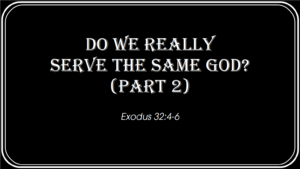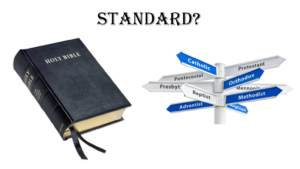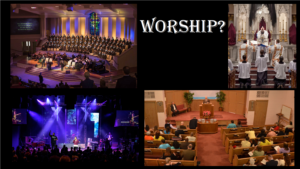Do We All Serve the Same God? (Part 2)
Exodus 32:4-6
Introduction.
We return to the question: do we all serve the same God?

Last week we asked that concerning the nature of God and some key things He has done (or hasn’t done).
The nature of the Hindu Trinity is very different; Jesus never went to India.
The nature of the Islamic Allah is very different; Jesus actually did die on the cross for our sins.
Concerning Mormonism, God was never like us; Jesus was never married, but He died so all our sins could be forgiven.
The nature of the Jehovah of JW is very different; Jesus is God and Man, and His body also rose from the grave.
This morning we want to turn our focus to religions that have a God of the same nature yet are different in other, more subtle ways.
Are they the same God?
Some might argue that they are, and that some are merely in error about that God.
That’s a fair argument: can we refer to something under a false description.
Say I’m colorblind, and I point out that the person over there in the orange jacket is a friend of mine. But his jacket is really green. Is that person still my friend? Yes, even though I did not describe him properly.
I would argue, however, that a God who wants everyone to be saved (2 Pet. 3:9; 1 Tim. 2:3-4) would make certain things very clear to anyone who is truly seeking (Matt. 7:7).
If someone is wrong on those key things, we cannot be serving the same God.
Preview (What are some of those key things?):
Standard.
Worship.
Salvation.
Body.
Sola Scriptura refers to the doctrine that the Scriptures are our only authority for faith and practice.
The term was first coined by Martin Luther in the 16th century AD.
But the doctrine did not begin there.
It is as old as the Bible itself, at least since the 15th century BC (Deut. 4:2).
One could take this to an extreme level and say that everything after Deuteronomy shouldn’t be in the Bible.
We know this isn’t true, so where is that line?
That line is the Word of God—nothing should be added to His words or taken from them.
Some will look at 2 Tim. 3:16-17 and say that the Scripture Paul is referring to is the OT, therefore we cannot add the NT to it.
While Paul is referring to the OT, the NT is also called Scripture (1 Tim. 5:8; 2 Pet. 3:15-16).
So the NT is included by Paul’s use of the word “all.”
But since the NT was being written in the first century, did the Apostles hold to Sola Scriptura?
They could not, not until the Scriptures were all written.
They held to the Word of God and the Word of God alone!
This is the essence of Sola Scriptura since the Bible alone is God’s Word.
Scripture plus tradition?
Some will contend that their tradition is also the Word of God.
The problem is they can’t really prove it—you just have to trust them and their writings.
Here’s why they can’t prove it: Which tradition should we follow?
There are several denominations that believe their tradition is the one handed to them by the Apostles—yet they all conflict in several key areas.
Orthodox believe only the first seven church councils are valid.
Catholics believe that the Spirit came forth from the Father and the Son (called Filioque Controversy).
Anglicans deny the place that Mary is given by the other two (Orthodox/Catholic).
Catholics condemn Anglicans for downgrading Mary.
Orthodox condemn Catholics for the Filioque.
Anglicans condemn Catholics for their position on Mary.
Maybe “condemn” is a strong word in some cases, but you get my point.
There is no standard for tradition outside of Scripture that we can use to gauge whether these traditions are from God or not, whether we have authority for them or not.
In truth, we all have traditions that we follow; the NT mentions to follow traditions (2 Thess. 2:15; 1 Cor. 11:2).
But those traditions were apostolic, and we have their writings, what they passed on, preserved in the NT Scripture for us today.
This is the standard by which we consider our traditions, whether they are from God or not, whether we have authority for them or not.
This is so important because of the possibility of our tradition making worship vain (Mark 7:6-8a, 9).
So, do we serve the same God if their Word is different?
I don’t mean different translations or manuscripts—they carry the same message.
Can they be the same God if the standard we use to determine what is truth and error is different or irreconcilable?
Many will say, “It doesn’t matter how you worship God, as long as you are sincere.”
That reasoning, when logic is applied, falls flat.
What if I choose to worship God by stealing money from a bank?
Some of that money will be put into the collection plate, too, so this is how I choose to worship God.
Well, that’s clearly wrong, because theft is sinful (Eph. 4:28).
So there must be some line indicating what is good and proper worship and what isn’t.
Where do we find that? In the standard we just talked about, His Word.
There are too many ideas on how to worship to mention here.
But God does care!
If He didn’t, would He have given so many commands on how to worship in the OT?
We see the reforms of worship that had to go on in Israel when a righteous king came to power, e.g. Hezekiah, Josiah.
You might say: “But we’re not in the OT era—we have more freedom than the constraints of the OT Law.”
Do we? Is Colossians 3:17 still in your Bible?
We must do all in His name—that includes worship.
Just as there are limits to what we can do in worship, there are limits to what we can do “in His name.”
Sure, we don’t have all the rules and regulations they did in the OT, but we do have instructions on worship in the NT.
In spirit and truth (John 4:24).
For edification (1 Cor. 14:26).
Done decently and in order (1 Cor. 14:40).
Much more.
Too many times do people go to worship to be entertained rather than to honor God. Entertainment is passive; worship is active!
If my God tells us how to worship Him, and you worship Him differently, is He the same God?
Consider the golden calf that Aaron fashioned at Mt. Sinai (Exo. 32:4-6).
The people proclaimed that the calf was the God that brought them out of Egypt.
Aaron then proclaimed a feast day to the Lord, that is to Yahweh, equating the true God with this idol.
Were they really worshiping the same God? They claimed he brought them out of Egypt and that they were worshiping him in this feast.
Do you suppose God is any different today? We must be careful how we worship Him, lest we end up worshiping a god of our own making!
The message of salvation is for all men everywhere today.
The Great Commission records Jesus telling His disciples to preach to those of every nation and to every creature (Matt. 28:19; Mark 16:15).
God commands everyone everywhere to repent (Acts 17:30).
Since this message is universal, do you suppose what one must do should be universal, too? – It should be!
Denominational beliefs on baptism, for example.
Some think you must be baptized to be saved; others think you simply need to make a mental ascent concerning the facts of the gospel; others think there’s nothing at all you can do to be saved.
Some think you can be baptized by sprinkling, pouring, or immersion; others think only immersion is acceptable.
Some think baptism must be in water; others think the medium is spiritual.
Some think babies should be baptized; others think only believers.
Some think baptism is for salvation; others think it’s only a symbol of your salvation; others think you should be baptized only because the Bible says to.
They can’t all be right!
If God requires of you different means of access to Him than He does of me, do we worship the same God?
It is conceivable that He would require different things of different people.
He only commanded Noah to build the ark, only commanded Abraham to sacrifice his son; only commanded Jonah to preach in Nineveh.
But the universal nature of the NT makes its commands universal.
God does not have differing requirements for salvation.
Conclusion.
Whether one is in error on these matters concerning the one true God or we both worship different gods, the result is the same.
If we have a different standard, we can’t really be sure of anything.
If we worship differently, one’s worship may be in vain.
If we have different requirements for salvation, how can you be sure of your salvation?
Two possibilities exist: either one of us is right, or none of us is.
Since the Bible says the church is an eternal kingdom (Dan. 2:44), then it stands to reason that someone is right.
Who is it? That can only be determined by the right standard.
That standard will tell us how to worship in a way that pleases God.
That same standard will tell us how to be saved.
Be saved as they were in the NT.



